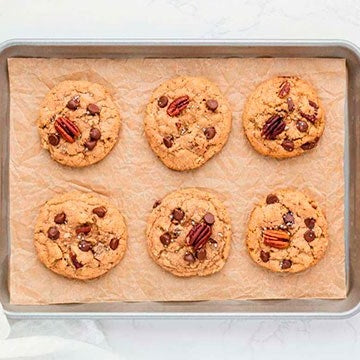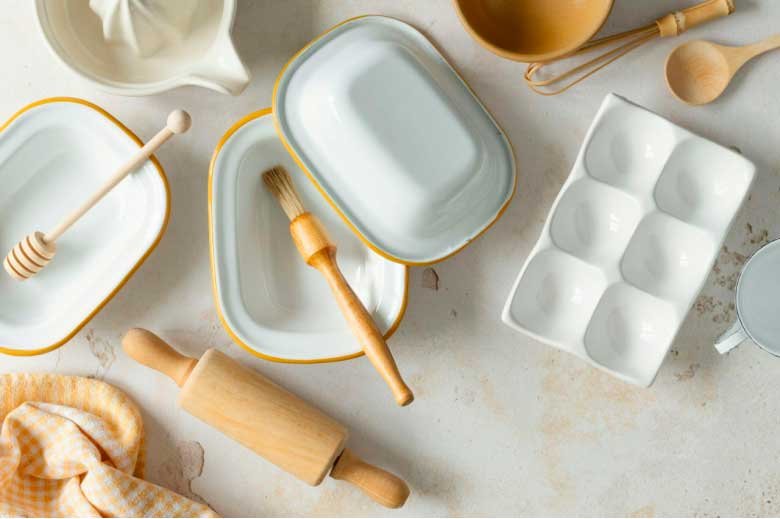
Safe Bakeware Guide: Nontoxic Materials & Healthier Alternatives
Share
The Problem with Conventional Bakeware
Conventional bakeware can present significant health risks due to the materials used in its construction. Aluminum bakeware, commonly used for muffin tins, loaf pans, and baking sheets, have the potential to leach aluminum into food, particularly when cooking acidic recipes like those containing tomatoes or citrus. Research has associated aluminum exposure with neurotoxicity and an increased risk of neurodegenerative conditions such as Alzheimer’s disease.

Nonstick bakeware, often coated with substances like (commonly known as Teflon), frequently contains PFAS, also known as "forever chemicals." These persistent environmental pollutants have been linked to hormone disruption, liver damage, and a heightened risk of certain cancers. Moreover, when overheated, nonstick coatings can release toxic fumes, posing serious health risks to humans and pets, particularly birds, which are highly sensitive to these emissions.
Safer, Nontoxic Options
Stainless Steel Bakeware
Durable, nonreactive, and free of coatings, stainless steel bakeware is a versatile and safe alternative. A go to for the chefs at Organic Pharmer, all their products are made in stainless steel.
Cast Iron Bakeware
Cast iron bakeware delivers excellent heat retention and even cooking. With proper seasoning, it creates a naturally nonstick surface without harmful chemicals.
Enameled Stoneware
Enameled bakeware combines beauty with functionality. It offers a naturally nonstick surface without PFAS, PTFE, or other synthetic coatings.
Food-Grade Silicone Bakeware
Silicone bakeware is flexible, lightweight, and naturally nonstick. When made from certified food-grade silicone, it is safe and free of BPA, phthalates, and fillers.
Scientific Insight
-
Aluminum Risks: High aluminum exposure has been linked to neurotoxicity, metabolic disorders, and neurodegenerative diseases like Alzheimer’s
-
Non-Stick PFAS Hazards: Persistent and toxic PFAS chemicals in nonstick coatings are associated with cancer, liver damage, and immune suppression.
-
Silicone: Food-grade silicone is safe at high temperatures, unlike plastics or lower-quality silicone, which may release harmful chemicals during baking.
Product Recommendations:

-
TeamFar Stainless Steel Baking Sheets and Bakeware
Affordable and made from premium food-grade stainless steel, these are rustproof, easy to clean, and dishwasher-safe. -
Lodge Cast Iron Bakeware
This collection includes everything from loaf pans to muffin tins. Lodge is known for its durable and chemical-free cookware that’s made to last generations. -
Le Creuset Enamel Glazed Stoneware
Stunning, durable, and certified free of lead, cadmium, and other harmful substances, Le Creuset bakeware resists scratches and stains. -
Silpat Baking Mats and Molds
High-quality, LFGB-certified food-grade silicone products that are reinforced with fiberglass for even baking.
Last Thoughts on Nontoxic Bakeware
Investing in high-quality, nontoxic options is a small yet powerful step toward creating a cleaner, safer kitchen—one that supports your health, the planet, and your culinary creativity. By choosing non-toxic cooking utensils, safe cutting boards, and non-toxic cookware, you can reduce exposure to harmful chemicals like PFOAs and phthalates while enjoying durable, eco-friendly tools designed to perform. These mindful choices not only protect your well-being but also promote sustainability, helping you create a toxin-free kitchen that nurtures your loved ones and aligns with your values. It’s a small change with a big impact—one that makes every meal a step toward a healthier, greener future.
About the Author

Lisa Malin, Founder of Grounded, is a Certified Holistic Health Coach dedicated to a personalized, whole-person approach to wellness. With a focus on active goal-setting and balanced living, she empowers clients to bridge the gap between where they are and where they want to be.
